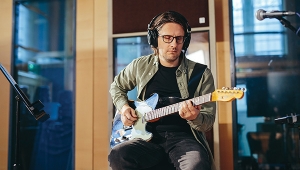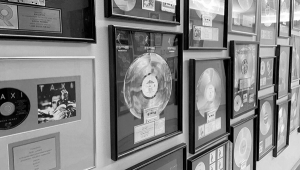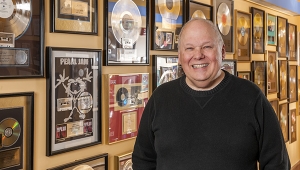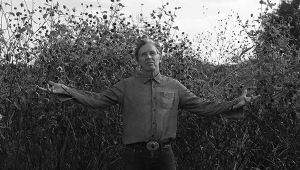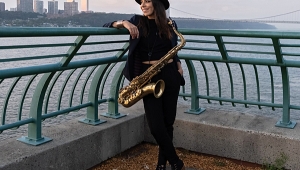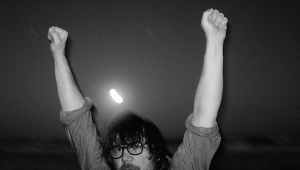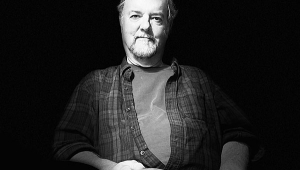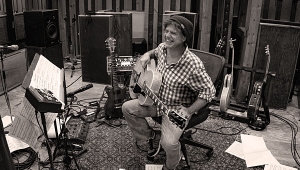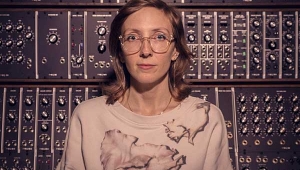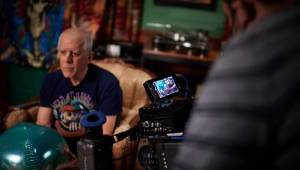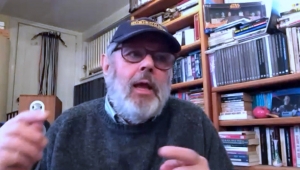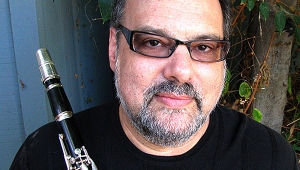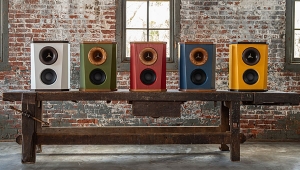| Columns Retired Columns & Blogs |
Ken Kantor: Now Hear This
Stereophile Editor John Atkinson walked into our office brandishing a CD (footnote 1). "Guess what Ken Kantor did? He took a year off from running NHT (footnote 2) to make this disc."
Footnote 1: Incoherent, Anxious Hippy Music 6601.
"That's really cool," I responded, drifting into a fantasy about what I'd do with a year off. "I'd like to meet a guy who'd do that."
"You could go visit NHT's factory when you're in San Francisco for HI-FI '97."
So I did. It wasn't a typical manufacturing plant, but NHT—like its founder—doesn't aim for the typical. It revels in its quirkiness. As I was shown around the factory, I observed an unusual number of musical-instrument cases in evidence. Kantor explained that NHT seemed to attract working musicians, and enthusiastic semi-pros, as employees. "Sometimes we feel we should consciously hire people who aren't musicians—but why wouldn't a musician want a job like this?"
That's certainly the impression I got from the folks I met there—they liked working for a company that produced high-quality loudspeakers. They understood how important listening to music could be to their customers.
Kantor and I talked for several hours, discussing everything from his own art, which festooned the walls of his office, to the evolution of the corn flake. (A shadow-box illustrating the development of different commercial flake shapes hangs over Kantor's desk.) But like all audiophiles, we mostly obsessed over music and hi-fi.
Ken Kantor: Until I was in college, I never really thought of myself as an "audio" person, even though I had built my own preamp. I just built my own because it was cheaper than buying one. Then I was assigned a lab bench at college and I found myself in the real hotbed of audio research of that era—perceptual research. This was the C.J. Lebel Lab at MIT, where we were actually researching what comprised audible differences—what could you hear and what couldn't you, and what made the difference?
Compared to that, my E.E. project just didn't seem all that interesting. I'd start to work on it, but I'd look over at the guy at the next bench, and his stuff was just much more fun. Finally, my advisor suggested I switch if I was that fascinated. My undergraduate electrical-engineering thesis focused on loudspeakers and perception—I had some ideas about why loudspeakers sounded the way they did that weren't coming out under the measurement methodologies of the time.
Wes Phillips: If you met that undergraduate version of yourself now—25 years later—would you still think his ideas were on the right track?
Kantor: Absolutely! I think I know a little more now; my ideas then, like most undergraduate thinking, were a little black and white, but I don't think they were fundamentally flawed. After all, they've influenced my thinking to this day. Boston was the nexus of the audio universe back then, both academically and commercially. My advisor informed me that the school did not fund undergraduate research, and suggested I contact some of the local companies about underwriting my thesis. Acoustic Research responded, saying, "Here's a check for $200, and we'll also supply all of the cabinets and drivers you want." Two hundred bucks represented almost six months of living expenses at that time, plus all the drivers I wanted—it was like manna from heaven!
Of course, AR granted my request because, in real terms, I was asking for nothing. But it established my first relationship with the company. I traveled out to the factory and saw piles of speakers and other stuff. That really hooked me! This was clearly a business that I could love. Because they'd funded my thesis, I had an entry into AR. When they needed something built for an experiment, or prototyped, I was there to do the grunt work. They always had stuff that needed doing and I always needed tuition money, so it was a natural development. And because of people I met there, I also got to work for Boston Acoustics, Bose, Sound Concepts...I was getting lots of experience.
I probably shouldn't admit this, but, after all, it was more than 20 years ago: Tech Hi-Fi educated an awful lot of engineers with its return policy. Whenever I would get an assignment like, say, prototyping a power amp, I would go down the block to Tech Hi-Fi and buy a bunch of equipment, stay up late tracing the circuits, and return the whole deal the next morning. I would intellectually vandalize everything I could get my hands on. "Where do they buy their drivers? Which output devices do they use?" I tested everything I could get my hands on.
Phillips: Wilson Mizner said, "If you steal from one author, it's plagiarism; if you steal from many, it's research."
Kantor: Exactly. After I graduated, I decided to study performance art and theater. But I eventually ran out of ideas for projects, and I also realized that I wasn't Ph.D. material. That's when the folks at NAD called me and proposed that I join their research department. I explained that I wasn't interested in doing research full-time; I was more interested in playing music than in audio design. So they proposed that I work three days a week, they'd move me to London, and they'd set me up with a small studio.
Footnote 1: Incoherent, Anxious Hippy Music 6601.
Footnote 2: Ken is now Technical Director of pro-audio active speaker manufacturer Vergence.
- Log in or register to post comments
